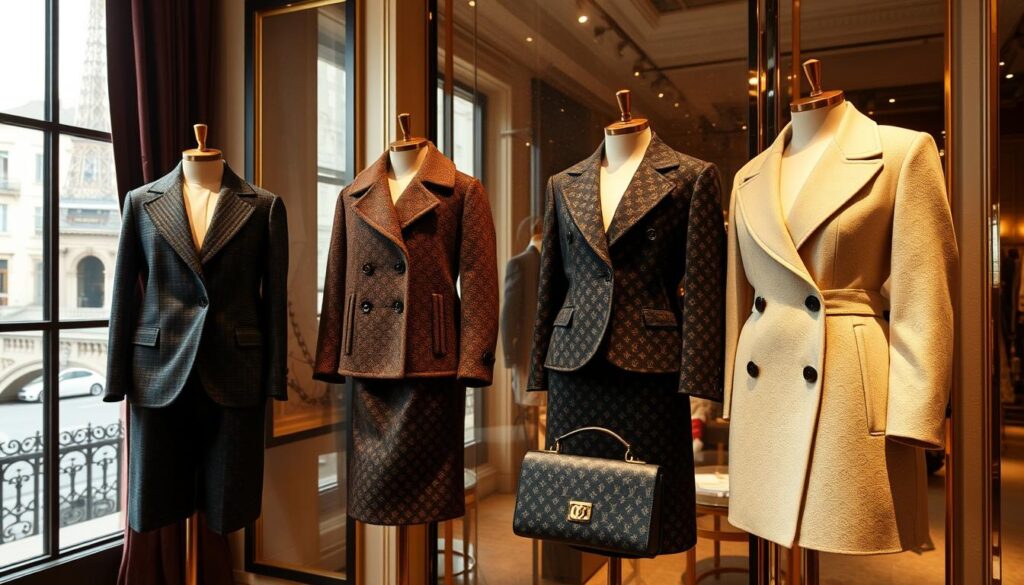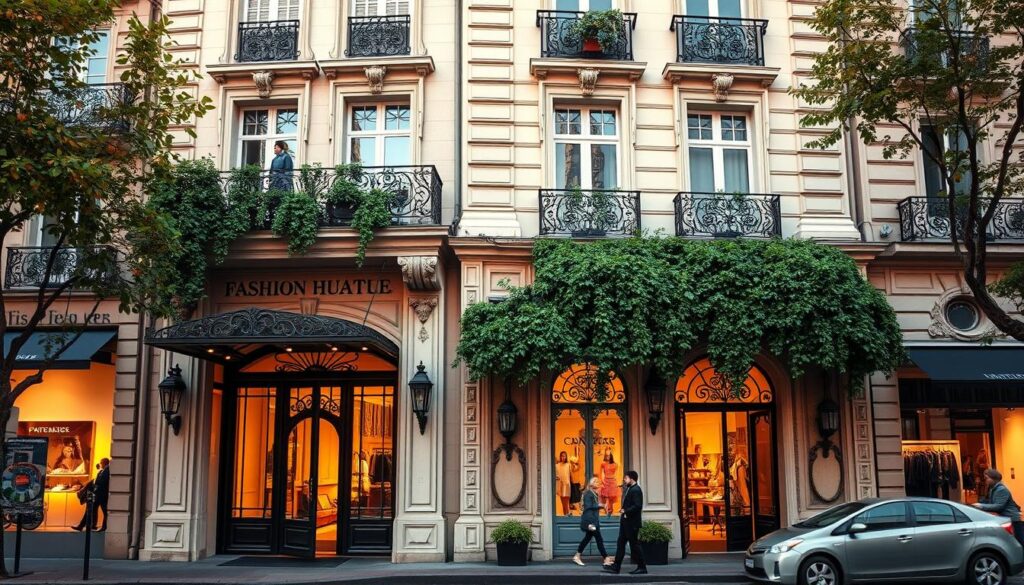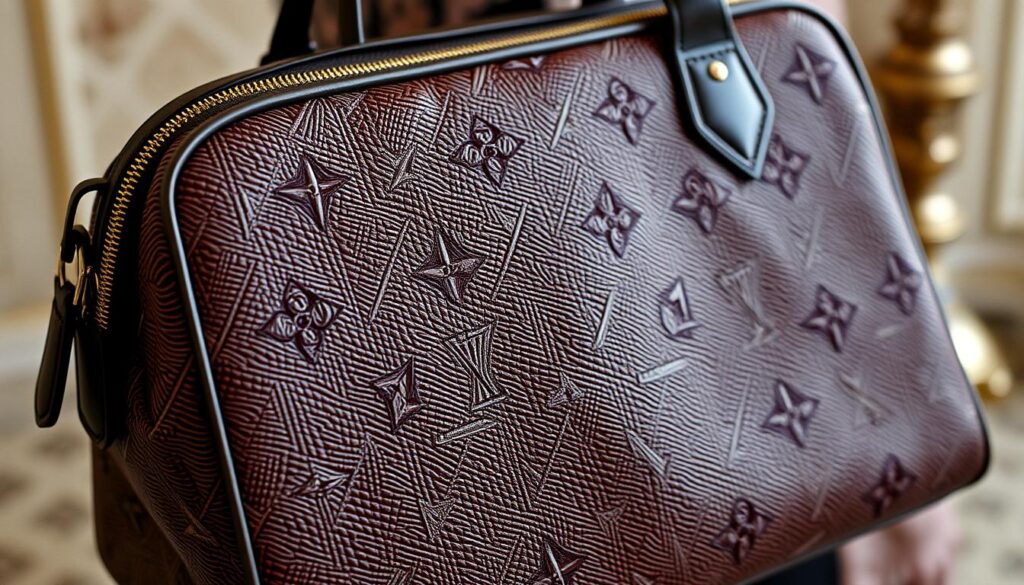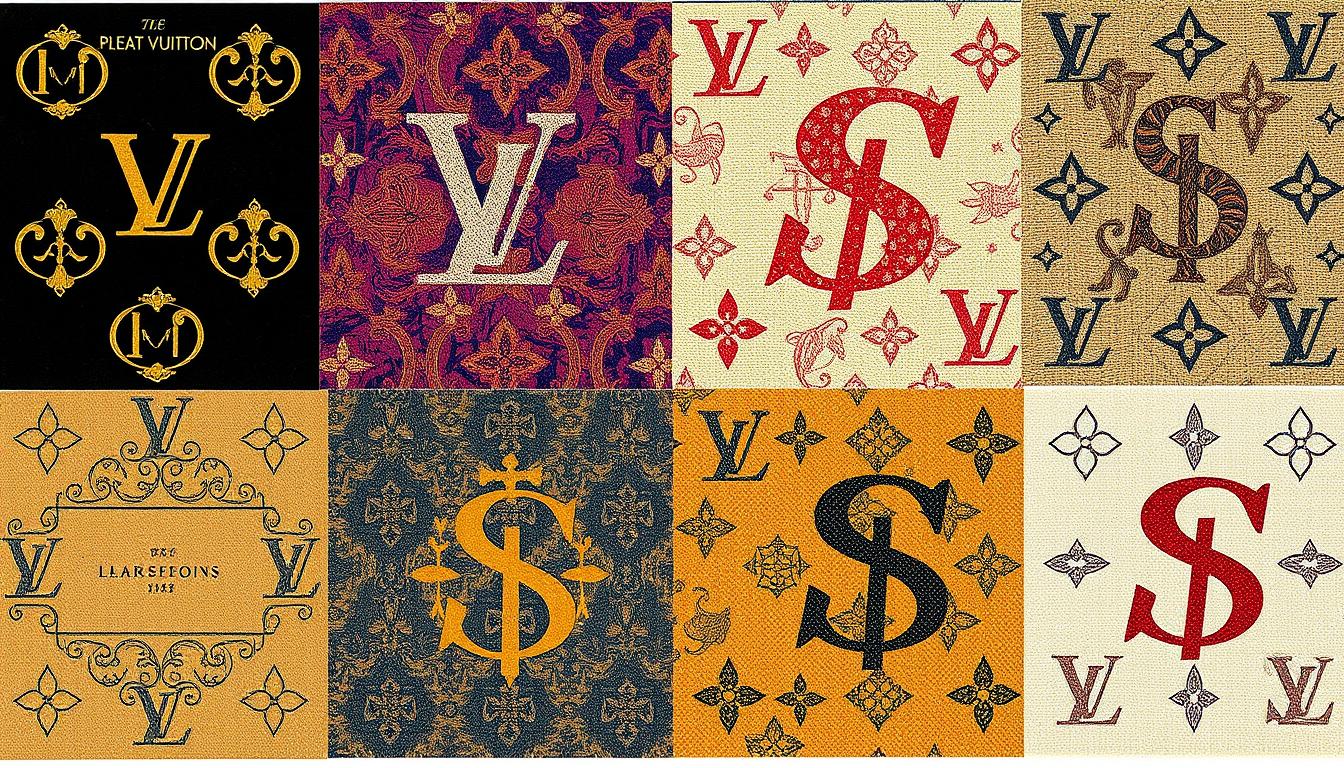Imagine a symbol that stands for luxury, exclusivity, and timeless elegance. This symbol is the french fashion monogram since 1962. Coming from Paris, these iconic monogram designs are more than patterns. They are a heritage and a high-end fashion statement cherished across cultures and generations.
The luxury Parisian fashion house has its roots with Yves Saint Laurent, starting in 1961. This brand became a key player in haute couture. In 2023, it reported revenues of €3.18 billion, showing the monogram’s lasting appeal. Not just successful commercially, the monogram has evolved, reflecting social changes and cementing its history in fashion.
Monograms have shone from Paris Fashion Week to YSL’s invention of ready-to-wear with Rive Gauche in 1966. Exploring the french fashion monogram since 1962 reveals artistry, cultural impact, and a relentless pursuit of excellence. These designs are not mere patterns; they are a legacy woven into the fabric of global fashion.
The Timeless Allure of French Fashion Monograms
The fascinating story of French fashion monograms begins deep in the history of elegant French fashion trends and French fashion history. These designs symbolize luxury and have become key to famous French fashion brands. Their story is marked by decades of creativity, change, and art.
Yves Saint Laurent led the way with his initials, changing fashion. His work brought high fashion to more people. He introduced “Le Smoking” and the affordable Rive Gauche line.
Defining the Luxury French Fashion Identity
In 1896, George Vuitton added luxury to practicality, creating a lasting visual identity. French fashion monograms are more than logos. They symbolize heritage, craftsmanship, and timeless elegance.
Exclusive Designer Collections Embellished with Monograms
Top French designers often use monograms as a design focus. Louis Vuitton and Chanel’s symbols are known for sophistication. Recent partnerships with streetwear brands have made these symbols popular with the youth.
The Evolution of Monogram Designs in History
Monogram designs have changed, blending modern trends with tradition. Since the 1960s, their popularity has grown. They’ve evolved but keep a link to a luxurious past. Pop culture and debates around authenticity continue. Yet, the charm of French fashion monograms endures, symbolizing elegance and status worldwide.
Iconic Monogram Fashion Trends Over the Years
![]()
The journey of monogram fashion trends reflects major style changes over time. Since the 1960s, French fashion monograms became luxury symbols. Louis Vuitton and Chanel made their marks with unique scripts and designs, shaping fashion eras.
Vintage Monogram Fashion Revivals
Lately, vintage monogram fashion is making a comeback. It’s popping up on runways and street styles, bringing back old charms. Modern collections are blending these classic patterns, attracting a new crowd of fashion lovers.
The Shifts in Monogram Style Preferences
Monogram styles have shifted from loud to subtle. These changes show how fashion reflects cultural values, mixing tradition with new ideas. Social media and influencers are making monogram trends more personal and bold.
Monogram as a Statement of Trendsetting French Couture
The monogram stands as a symbol of trendsetting French couture. It represents brand identity, sophistication, and heritage. Designers are innovating with new materials and sustainability, looking into the future with monograms.
Monograms have grown in popularity, reaching beyond fashion into lifestyle goods. This mix of old and new is pushing monogram trends forward, with a promising future.
French Fashion Monogram Since 1962
In 1962, the French fashion monogram changed luxury French fashion forever. Yves Saint Laurent started its journey that year. This monogram stands for Parisian sophistication and style that attracts fans worldwide.
The monogram is known for its beauty and cultural meaning. It showed the creativity of the 1960s fashion world. With its artistic flair and timeless elegance, it earned a special place in fashion’s history.
Monogrammed designs became signs of true luxury. French fashion brands used monograms to stand out globally. From Hermès in 1837 to Chanel in 1909, monograms showed the brands’ quality and skill.
- Hermès – Established in 1837, known for its distinctive ‘H’ monogram.
- Chanel – Came into existence in 1909, celebrated for its double ‘C’ logo.
- Louis Vuitton – Founded in 1854, recognized for its ‘LV’ initials.
- Givenchy – Originating in 1952, identified by its merged ‘G’ design.
These monograms mean tradition and prestige. They bring a piece of French luxury fashion history to lovers of style. Each tells the brand’s story and how fashion has evolved since it began.
The term french fashion monogram since 1962 is now part of fashion history. It even appeared in a New York Times Mini Crossword puzzle. This shows how important these symbols are in fashion and culture.

In our fast-paced digital world, fashion trends change quickly. Yet, the french fashion monogram since 1962 remains a constant symbol of elegance. It keeps the heritage and luxury of historical brands alive.
How the Luxury Parisian Fashion House Became a Historical Brand
The rise of the luxury Parisian fashion house to historical prominence is a tale of artistry, style, and innovation. The heart of its lasting charm is the french fashion monogram since 1962. This emblem is known for top-notch quality and opulence.

For years, these monograms have been more than quality marks; they narrate the brand’s legacy, innovation, and endless pursuit of beauty. Now, the monogram stands as a symbol of luxury, merging history with modern flair in each creation.
“A monogram doesn’t just brand a product; it encapsulates a legacy of visionary artists and timeless designs.”
The essence of the luxury Parisian fashion house remains true to its origins while embracing change. Since 1962, this vision has urged the brand to honor tradition while being forward-thinking.
- The bold introduction of exclusive collections
- Innovative design and use of high-quality materials
- Understanding cultural shifts and adapting to modern trends
The french fashion monogram since 1962 goes beyond looks; it signifies excellence, promises skillful making, and represents a legacy of luxury. As the fashion house moves ahead, its historical importance is ensured by its capability to innovate and hold onto its esteemed roots.
The Craftsmanship Behind Timeless Monogram Fashion Pieces
Making timeless monogram fashion is more than design. It’s a mix of tradition, precision, and artistic vision. This detailed process makes each piece elegant and continues the monogram legacy.
The Intersection of Art and Fashion in Monogramming
Monogramming combines art and fashion uniquely. Designers and artisans from brands like Chanel, started by Gabrielle “Coco” Chanel in 1910, and Hermès, since 1837, pour historical reverence and creativity into their work. These items are like art pieces, showing off skilled craftsmanship and artistic vision.
Meticulous Creation Process of Monogrammed Garments
Crafting monogram fashion items is complex. For instance, making a Hermès Kelly bag takes 15 to 20 hours. This craft honors tradition with careful attention to every stitch, maintaining the brand’s legacy and the monogram’s timeless appeal.
Preserving the Monogram Fashion Legacy Through Quality
Quality is vital to the monogram fashion heritage. Brands like Cartier, started in 1847, and Givenchy, in 1952 by Hubert de Givenchy, focus on top-notch quality. They aim to ensure their monogrammed items last, keeping their rich history alive.

Revolutionary French Fashion Figures and Their Monogram Influence
The landscape of French couture is rich in both history and style. It’s been shaped by iconic figures. Their innovative visions have set trends and helped the luxury market grow to €16bn. These designers are known for their unique collections marked by their monograms. These symbols show the essence of their fashion houses. They’ve made Paris, with its many fashion houses, the heart of high-end fashion.
Consider Yves Saint Laurent, who changed the game by launching the first ready-to-wear line from a French couturier. This move shifted how fashion was consumed. His label’s monogram, created by A.M. Cassandre in 1963, led the way in fashion branding. Saint Laurent also introduced the Le Smoking tuxedo and a military-style peacoat as high-end fashion in 1962. Christian Dior’s brand, set up in 1946, became famous for its New Look silhouette and the Bar Suit. Dior started using monograms in 1947, adding luxury and elegance to his designs.
The impact of monograms goes beyond just design. Coco Chanel’s double C’s became as iconic as her Chanel No. 5 perfume and the Chanel suit. Brands like Louis Vuitton and Givenchy have used their unique monograms to stand out. Louis Vuitton is known for its leather trunks, and Givenchy for the Balloon Coat and Black Givenchy Dress. These monograms have helped them become leaders in French haute couture and global fashion icons. Their designer collections, marked by these unique symbols, continue to dominate the luxury market. This secures their place in the history of style.
